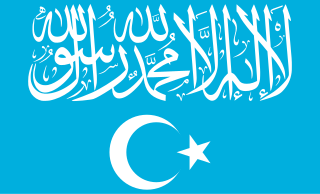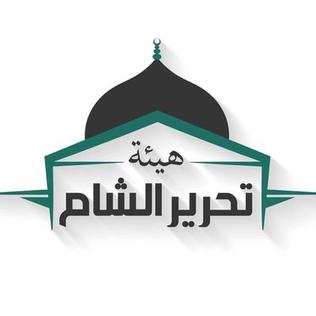
Ansar al-Islam in Kurdistan, simply called Ansar al-Islam, is a Kurdish Islamist militant and separatist group. It was established in northern Iraq around the Kurdistan Region by Kurdish Islamists who were former Taliban and former Al-Qaeda volunteers, which were coming back from Afghanistan in 2001 after the Fall of Kabul. Its motive is to establish an Islamic state around the Kurdistan region and to protect Kurdish people from other armed insurgent groups. It imposed strict Sharia in villages it controlled around Byara near the Iranian border.

The Turkistan Islamic Party (TIP) is a terrorist Uyghur Islamic extremist organization founded in Pakistan by Hasan Mahsum. Its stated goals are to establish an Islamic state in Xinjiang and Central Asia.

The Islamic Jihad Union is a militant Islamist organization founded in 2002 as a splinter group of the Islamic Movement of Uzbekistan (IMU). Headquartered in North Waziristan, a mountainous region of northwest Pakistan, bordering Afghanistan, the group has been affiliated with both Al-Qaeda and the Taliban.

Al-Nusra Front, also known as Front for the Conquest of the Levant, was a Salafi jihadist organization fighting against Syrian government forces in the Syrian Civil War. Its aim was to overthrow president Bashar al-Assad and establish an Islamic state ruled by Sharia law in Syria.

Harakat Ahrar al-Sham al-Islamiyya, commonly referred to as Ahrar al-Sham, is a coalition of multiple Islamist units that coalesced into a single brigade and later a division in order to fight against the Syrian Government led by Bashar al-Assad during the Syrian Civil War. Ahrar al-Sham was led by Hassan Aboud until his death in 2014. In July 2013, Ahrar al-Sham had 10,000 to 20,000 fighters, which at the time made it the second most powerful unit fighting against al-Assad, after the Free Syrian Army. It was the principal organization operating under the umbrella of the Syrian Islamic Front and was a major component of the Islamic Front. With an estimated 20,000 fighters in 2015, Ahrar al-Sham became the largest rebel group in Syria after the Free Syrian Army became less powerful. Ahrar al-Sham and Jaysh al-Islam are the main rebel groups supported by Turkey. On 18 February 2018, Ahrar al-Sham merged with the Nour al-Din al-Zenki Movement to form the Syrian Liberation Front.
Al-Fu'ah is a town in northern Syria, administratively part of the Idlib Governorate, located northeast of Idlib. Nearby localities include Kafriya to the west, Maarrat Misrin to the northwest, Zardana to the north, Taftanaz to the northeast, Ta'um to the east and Binnish and Sarmin to the south. The plain surrounding al-Fu'ah is well known for growing olives and figs.

Foreign fighters have fought on all four sides of the Syrian Civil War, as well both sides of the War in Iraq. In addition to Sunni foreign fighters, Shia fighters from several countries have joined pro-government militias in Syria, leftist militants have joined Kurdish forces, and other foreign fighters have joined jihadist organizations and private military contractors recruit globally. Estimates of the total number of foreign Sunnis who have fought for the Syrian rebels over the course of the conflict range from 5,000 to over 10,000, while foreign Shia fighters numbered around 10,000 or less in 2013 rising to between 15,000 and 25,000 in 2017.

Jund al-Aqsa, later known as Liwa al-Aqsa after 7 February 2017, was a Salafist jihadist organization that was active during the Syrian Civil War. Formerly known as Sarayat al-Quds, the group was founded by Abu Abdul 'Aziz al-Qatari as a subunit within the al-Nusra Front. The group later became independent, because al-Nusra was growing too rapidly for its resources and had suffered from fighting the Islamic State of Iraq and the Levant. On 20 September 2016 the U.S. Department of State designated Jund al-Aqsa as a terrorist organization. The group rejoined al-Nusra Front, by then renamed Jabhat Fateh al-Sham (JFS), in October 2016. However, on 23 January 2017, JFS declared that Jund Al-Aqsa was no longer part of Jabhat Fateh Al-Sham. In early February 2017, some of Jund al-Aqsa's units joined the newly formed Tahrir al-Sham, while the others refused and formed a new splinter group called Liwa al-Aqsa, and captured many towns in northern Hama and southern Idlib from other rebel groups. Following these attacks, Tahrir al-Sham launched a military operation against Liwa al-Aqsa, accusing them of being an ISIL affiliate. Following intense clashes with Tahrir al-Sham, up to 2,100 Liwa al-Aqsa militants left Idlib Province to join ISIL in Raqqa Province, by 22 February 2017.

Ahmed Hussein al-Shar’a, known by his nom de guerre as Abu Mohammad al-Julani, is a Syrian militant leader who is the commander-in-chief of the militant group Tahrir al-Sham.

The Turkistan Islamic Party in Syria is the Syrian branch of the Turkistan Islamic Party, an armed Uyghur Jihadist group with a presence in the Syrian Civil War. While the TIP has been active in Syria, the organization's core leadership is based in Afghanistan and Pakistan, with a presence in its home territory of China.

Uran Toktonazarovich Botobekov is a Kyrgyz scholar, journalist, diplomat and publicist. He was an opposition activist until 2016 when he emigrated. He is also the author of more than 60 scientific and analytical articles on politics, religion and economy of the post-Soviet Central Asian states. His scientific works were published in magazines in several countries.
Abdullah al-Muhaysini, is a Saudi Arabian Salafi cleric who is known for having served as a religious judge in the Army of Conquest in the Syrian Civil War.

Hay'at Tahrir al-Sham, commonly referred to as Tahrir al-Sham, is a Sunni Islamist political and armed organisation involved in the Syrian Civil War. It was formed on 28 January 2017 as a merger between Jaysh al-Ahrar, Jabhat Fateh al-Sham (JFS), Ansar al-Din Front, Jaysh al-Sunna, Liwa al-Haqq, and Nour al-Din al-Zenki Movement. The unification process was held under the initiative of Abu Jaber Shaykh, an Islamist commander who had been the second Emir of Ahrar al-Sham.

Tanzim Hurras al-Din also known as Al-Qaeda in Syria, is a Salafi Jihadist organization fighting in the Syrian Civil War. The group's head, Abu Humam al-Shami was the general military commander of the defunct al-Nusra Front, and had fought for Al-Qaeda in 1990s Afghan civil war and the Iraqi insurgency. Hurras al-Din was established by the leaders of the AQ-affiliated Khorasan group and Al-Qaeda loyalists of Al-Nusra Front who opposed Jabhat Fatah al-Sham 's dissolution and merger with other Islamic groups to form Tahrir al-Sham. Abu Humam Al-Shami announced the formation of Hurras al-Din on 27 February 2018.

The Ebaa News Agency is a media outlet linked to Hayat Tahrir al-Sham and reports on events surrounding the group, and the civil administration linked to the group, the Syrian Salvation Government.
Insurgency in Idlib is an ongoing insurgency in the regions Idlib Governorate between multiple factions. The conflict is primarily between the supporters of Syrian Salvation Government and forces loyal to Syrian Arab Republic. Other factions participating in insurgency range from the Syrian opposition forces in the Syrian National Army supported by Turkey; to supporters of Al-Qaeda branch Hurras al-Din and members of the Islamic State group. The insurgency has been marked by assassinations and bombings, as well as armed confrontations with small arms and raids.

Foreign fighters in the Syrian civil war have come to Syria and joined all four sides in the war. In addition to Sunni foreign fighters arriving to defend the Islamic State of Iraq and the Levant or join the Syrian rebels, Shia fighters from several countries have joined pro-government militias in Syria, and leftists have become foreign fighters in the Syrian Democratic Forces.

Katibat al-Tawhid wal-Jihad is an Uzbek/Kyrgyz jihadist militant organization based in Syria.

Katibat al-Ghuraba al-Turkistan is a predominantly Uyghur militant Jihadist group based in Syria.
The Al-Qaeda–Islamic State conflict is an ongoing conflict between Al-Qaeda and its allied groups, and the Islamic State.
















